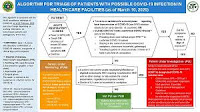This was posted to Facebook and Twitter by President Trump's campaign: a clip of an interview Trump did Wednesday with Fox News in which he said children were “virtually immune” from the Covid-19 coronavirus. “[Children] don’t have a problem, they just don’t have a problem,” Trump said in the video as part of an argument for why schools should reopen. “It doesn’t have an impact on them. I’ve watched some doctors say they’re totally immune.” To their credit, both Facebook and Twitter took the posts down pursuant to their policy against pandemic-related misinformation. (For the record, non-pandemic misinformation is still okay.) And Twitter briefly suspended the campaign's access to Twitter.
Last month John Cornyn questioned whether children can get COVID-19 or even transmit the virus. Who are the experts these people are talking to? A call to a pediatric hospital ER would bring them up to speed.
Or Google "children + COVID." The first link is to the CDC's page with the title "Help Stop Spread of COVID-19 in Children." Here's the first sentence on that page: "Based on available evidence, children do not appear to be at higher risk for COVID-19 than adults." It doesn't take a Ph.D. in epidemiology to parse this sentence. It doesn't say children are at no risk. It doesn't say they are at lower risk. It says that as far as we know they are at the same risk as adults. See also "Characteristics of COVID-19 in febrile infants 2 months of age and younger" in 2MinuteMedicine.com.
Misleading the public about the risk of COVID-19 is no small thing. It is a violation of a fundamental obligation our leaders have to BE USEFUL, especially during a damned pandemic. Misrepresentations are not useful. At a time when school districts across Texas and around the country are trying to figure out how to open safely, or if they can open at all, dismissing the risk to school children with phrases like "no impact" and "totally immune" is reckless and dangerous.


















